




 |
   |
 |
|
Movies Moxy Früvous Mudcrutch Muffs |
Mugen Martin Mull David Mullen |
Multi-Story Mary Mundy Murder By Death |
Murder City Devils J.F. Murphy & Salt Mark Murphy |
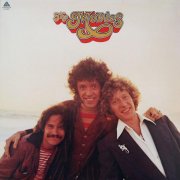 |
The Movies (1976, 35.25) **½/T |
|
| Dancin' on Ice Rainy Weather American Beauty Rose Satellite Touchdown Better Wages, Better Days Empty Room If I Can Just Get Through Tonight You Think You're Too Good to Be True |
Sugarloo Would You Believe? |
|
Current availability:
Mellotron used:
The Movies unintentionally confused matters greatly with their name and sole album title, as an identically-monikered British outfit (previously the exceedingly obscure Public Foot the Roman) also released an eponymous debut the previous year. The American Movies slot firmly into that now-deeply unfashionable 'piano-led late '70s pop/rock' bracket, like a cross between, say, Supertramp and Billy Joel. The album has its moments, not least cheery opener Dancin' On Ice and the swing-era references in Sugarloo, but overall, it's all a bit bland, I'm afraid.
Michael Morgan plays Mellotron, with a cello line and string part on Better Wages, Better Days, although the strings on If I Can Just Get Through Tonight and Would You Believe? are real. To absolutely no-one's surprise, this isn't available on CD, or even official download; does this style have any fans these days? Harmless enough, then, with one decent Mellotron track, but not exactly what you'd call exciting.
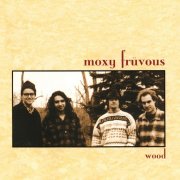 |
Wood (1995, 51.21) ***/T |
|
| Down From Above Horseshoes Fly The Present Tense Tureen Poor Mary Lane On Her Doorstep Misplaced It's Too Cold |
Bed and Breakfast Nuits de Rêve Sad Today Organ Grinder |
|
Current availability:
Mellotron used:
Nothing to do with Canadian second-division hard rock crew Moxy, Moxy Früvous have been known to say that they picked the name because it was neither memorable, nor meant anything, which is quite admirable in itself. Forming in 1989, partially as an a capella political outfit, they broke through at around the same time as Barenaked Ladies, while being considerably less irritating. 1995's Wood was their second album, largely falling (loosely) into the folk area, their massed vocal arrangements bearing comparison with CSN&Y. Better tracks include opener Down From Above, Horseshoes, the jokey, banjo-fuelled The Present Tense Tureen and the very Gallic Nuits De Rêve, but nothing here offends in the way of some of their wackier countrymen.
David Matheson plays Mellotron on Sad Today, with a full, solo flute arrangement at the end of the track, closing the album 'proper', before ridiculous bonus track Organ Grinder. All in all, a very listenable album, providing you're not allergic to acoustic guitars and on/off acerbic lyrics, with one nice Mellotron track, or rather, section.
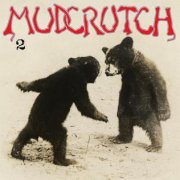 |
Mudcrutch 2 (2016, 43.16) ***½/T½ |
|
| Trailer Dreams of Flying Beautiful Blue Beautiful World I Forgive it All The Other Side of the Mountain Hope Welcome to Hell |
Save Your Water Victim of Circumstance Hungry No More |
|
Current availability:
Mellotron used:
Mudcrutch? For those of you who know little of Tom Petty's pre-fame existence, they were his Florida-based band that moved to California in '74, eventually morphing into The Heartbreakers after a few lineup changes, Petty assuming bandleader status. I don't know what brought about their on/off 2000s reformation, but the end results appear to justify his faith in his old muckers, certainly going by 2016's Mudcrutch 2, a pleasant, if undemanding album of Pettyesque country rock tailor-made to appeal to his sizeable fanbase. Top tracks? Probably the Farfisa-driven The Other Side Of The Mountain, the country rock thrash of Victim Of Circumstance and semi-epic closer Hungry No More, although 'best lyric moment' goes to Benmont Tench's lead vocal on the rock'n'roll-ish Welcome To Hell: "Welcome to hell/population: me."
Tench (present and correct in Pettyland since original Mudcrutch days) plays rather muted Mellotron on a handful of tracks, with strings on opener Trailer, Beautiful World and Hungry No More, plus what sounds like combined flute and strings on I Forgive It All. Incidentally, top marks to Petty for his loyalty to his old bandmates, doubtless providing them with a decent retirement fund, should it be needed; a rarity in 'the biz', given how many successful artists drop the people who made them like a stone as soon as they outlive their usefulness. Yes, David Bowie, I'm looking at you. And you, Marc Bolan. I'm not sure why I single those two out, mind, given the practice's prevalence...
See: Tom Petty
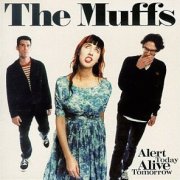 |
Alert Today Alive Tomorrow (1999, 34.05) ***/½ |
|
| I Wish I Could Be You Silly People Another Ugly Face Prettier Than Me Clown Your Kiss Numb I'm Not Around |
Blow Your Mind Room With No View Dear Liar Love Me In Jack Champagne |
|
Current availability:
Mellotron used:
The Muffs are a California-based punk/pop outfit, originally all female, though the rougher sex slowly infiltrated, until by their fourth album, 1999's Alert Today Alive Tomorrow, two of the trio were male, including Redd Kross drummer Roy McDonald, leaving frontwoman Kim Shattuck as the sole original member. The album appears to have been released in at least two different versions, making reviewing it a tad confusing, but I think it's safe to say that whichever version you get, it's going to be stuffed full of decent pop/punk tunes that predate the likes of the tedious Green Day by quite some way, avoiding their sense of 'humour' in the process.
Brian Kehew of Moog Cookbook plays Mellotron, although it only crops up on Dear Liar Love Me, with a rather muted, though nicely played strings intro. Why is it here? Who knows, but don't look a gift-horse in the mouth, eh? So; pop crossed with punk, or vice versa; The Buzzcocks did it over twenty years earlier, as did The Ramones, in their own way, but that doesn't make this less valid. No classic, but decent enough at what it does, with a short but sweet Mellotron part to boot.
See: Redd Kross
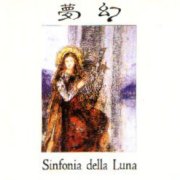 |
Sinfonia Della Luna (1984, 46.05/52.09) ***½/TTSinfonia Della LunaMagical Wand Venezia Dance... Romantic A Parade of the Wonderland Ballo Della Luna [CD adds: Leonardo] |
 |
Léda et le Cygne (1986, 44.31) ***½/TTT½Léda et le CygneLa Rosa Salomé Edmond's Old Mirror Bluge Kamira Pavane pour une Infante Défunte |
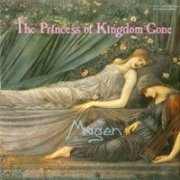 |
The Princess of Kingdom Gone (1988, 43.59) ***/T½The Princess of Kingdom GoneThe Lady of Shalott Legend of the Forest Dazzling Ligeia Black Panther Trident Rock Una Donna |
Current availability:
Mellotrons used:
Mugen are yet another Japanese prog band from the '80s (by no means necessarily a bad thing), Sinfonia Della Luna being the first of their three releases. I'm afraid I find it a little cheesy in places, with overly 'sweet' synth leads, although no worse than many of their contemporaries and better than many. Occasional Genesis comparisons, not least the synth/organ break in Dance... Romantic, or the 12-string work in Leonardo, but most of the album doesn't sound too like anybody else. Ballo Della Luna is excellent, a lengthy acoustic part kicking things off (so to speak), although the side-long title track is probably overlong and one of the worst offenders on the cheese front. Katsuhiko Hayashi uses (presumably) analogue string synth on most tracks, with a rather insipid choir sound, generated from an unknown keyboard, but he gets some Mellotron in occasionally. Sinfonia Della Luna itself has a short flute part, well into the song, as does Leonardo, added to the CD release, while Venezia goes for a full-on strings part, as does Ballo Della Luna, with a beautiful unaccompanied Mellotron section, bumping its T rating up slightly.
Léda et le Cygne is better than its predecessor, if not quite a four-star effort, although several tracks still manage some of those cheesy synth brass parts beloved of '80s Japanese outfits. The Genesis influence is less obvious this time round, although a few seconds in Salomé are straight out of The Return Of The Giant Hogweed and a synth arpeggio later on could easily have come from the pen of Mr. Banks. Hayashi sticks Mellotron all over, this time, the first sound on the album being a faint Mellotron strings part leading into the title track, strings and flutes scattered across most of the rest of the album. The choirs on Salomé are distinctly un-Mellotronlike, so whatever their tapeframe's third sound is doesn't appear to get used, but there's enough string work to get your Mellotron Aficionado all hot under the collar. Which is nice.
Mugen's third and final album, the frequently-misspelled The Princess of Kingdom Gone, gets a bad rap from many online reviewers, but is near-as-dammit the match of their debut, if not quite as good as its predecessor. It may sound in places like they're running out of ideas, but I've heard an awful lot worse, not least from the contemporaneous Japanese scene. Not an awful lot of Mellotron this time round, just strings on the title track and strings and flutes on Trident Rock, all other string parts appearing to be generic samples.
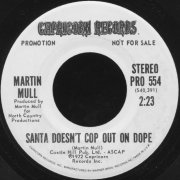 |
7" (1973) **/T Santa Doesn't Cop Out on Dope Santafly |
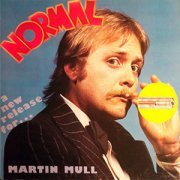 |
Normal (1974, 35.39) **/T |
|
| Normal Wood Shop Dialling for Dollars Woodstock Samba Rome and Bored Flexible Jim'n I Drunkard's Waltz |
The Blacks Are Giving Me the Blues Birthday Jesus Christ Football Star Ego Boogie You Play Rhythm |
|
Current availability:
Mellotrons used:
"Does humour belong in music?", Frank Zappa once asked, except he spelt 'humour', 'humor', being a Yank. There's a long and (dis)honourable tradition of musical humourists, from the brilliantly acerbic (Tom Lehrer), through to the low-brow, low-budget ("Weird Al" Yankovic, whose quality is summed up by his need to point out his 'weirdness'). Martin Mull (1943-2024) was an actor who discovered a yen for stand-up comedy and has pursued parallel careers in straight acting, comedy and musical parody, although the latter seems largely confined to the '70s, which may well be a good thing.
Santa Doesn't Cop Out On Dope was his rib-tickling Christmas single from 1973 and is... awful. It's not even funny, certainly by today's standards, with tedious lyrics about why Santa doesn't do heroin ('dope' in the States). Unfunny. The strings are real, but Keith Spring's polyphonic Mellotron flute part is pretty cool, although I wouldn't go as far as to call it a saving grace. If you really must hear it, it's apparently anthologised not only on a Mull CD compilation, Mulling it Over: A Musical Oeuvre-View of Martin Mull, but also a generic Christmas effort, Have a Nice Christmas: Holiday Hits of the 70s.
Normal was Mull's third album; while it may well've been side-splittingly hilarious in its day, I'm afraid to say, all these years on, it raised nary a titter here. The music is largely swing-era parody, probably a legitimate means of humorous expression in '70s America, rather as Music Hall was in the UK, now just sounding horrendously dated, as do many of Mull's targets. The Blacks Are Giving Me The Blues (a vaguely disco-ish effort) is presumably meant to be funny, but just comes across as racist, while Drunkard's Waltz sounds like no-budget Lehrer; nothing else stands out sufficiently for me to remember anything about it, minutes after the album's end. The album contain's Mull's other Mellotron track, Woodstock Samba. Its short lyric appears to take a poke at the dullness of life in Woodstock (told you he was funny), set to the usual swing-era accompaniment, until Spring comes in on Mellotron flutes, playing the most beautiful solo part at the end of the song. No, really. By the way, it was Yoko Ono's M400; she was recording in an adjoining studio and it was sitting in the corridor, so Spring rattled out a quick take on it while no-one was looking.
I wouldn't actually advise you to buy this album for its Mellotron content, but if you get a chance to hear this one track, it's actually worth a few minutes of your time. Please don't buy anything else by Martin Mull, though, as he's neither interesting nor funny. Of his time. Incidentally, thanks to Keith Spring for confirming various details.
 |
David Mullen (1994, 47.24) **/T |
|
| Change Has Gotta Come Time Please The Beauty of it Hero Help All God Has A Slice of Heaven |
The Prodigal (One More Try) It Ain't Easy He Comes |
|
Current availability:
Mellotron used:
Ex-(American) footballer David Mullen got God and became a CCM artist in the eighties, 1994's David Mullen being his third and last album. Rather than the usual litest-of-lite folk/pop, it takes '60s soul and r'n'b as its chief template, better efforts including the Tom Petty-esque All God Has and the blues-rock of It Ain't Easy, although the bulk of the album is teeth-grindingly bad, particularly on the lyric front.
John (Mark) Painter, Mellotron player to the Christian community, adds Mellotron strings to The Beauty Of It and flutes (and cellos?) to closer He Comes, although the strings on a couple of other tracks sound real. Why would you bother with this? I've no idea. Let's be thankful Mullen seems to have stopped making records.
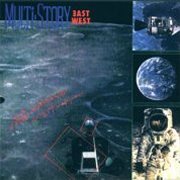 |
East/West (1985, 39.21) *½/TTEast/WestBreaking Ground Traveller Ahead of Your Time Carrie Come Alive The Wire Heroes |
Current availability:
Mellotron used:
I remember Multi-Story (named for an allegedly fortuitous meeting in a car park) as a bit of a joke on the mid-'80s prog scene; signed to Heavy Metal Records' offshoot FM, they (fittingly) had a sound closer to AOR than prog, even of the neo- variety. And would'ja believe it? Time hasn't softened my attitude in the slightest; if anything, East/West sounds even worse now than it did then. Songs of the 'quality' of the horrible Breaking Ground (originally and more sensibly entitled 'Breaking New Ground', which at least makes sense) make the likes of Marillion sound good. Well, almost. OK, so the playing's alright, but since when did that make an album any good? The songs are cheesy, the synths are worse and as for the wishy-washy vocals...
You may've gathered by now that I don't like this album very much. Correct. It encapsulates everything that's bad about '80s UK prog, with barely any redeeming features whatsoever, although the lengthyish Ahead Of Your Time is a little less painful than the rest of this sorry LP. Actually, if you're looking for a comparison, the awful Pendragon are about the closest I can come up with and, believe me, that is NO recommendation... In fact, about the only nice thing I can think of to say about it is (you've guessed it) Rob Wilsher's Mellotron use, sounding bizarrely out of place across much of the record, the aforementioned Ahead Of Your Time possibly excepted. The title track only appears to contain one brief string swell, but Traveller and Ahead Of Your Time are quite laden down with some halfway decent choir work, with a little more in closer Heroes.
Despite two passable Mellotron tracks, this is shite and should be avoided at all costs, unless you're either a) a serious neo-progger, or b) a serious masochist. Incidentally, the band appear to have reformed. Run for the hills! Also incidentally, I'm reliably informed that there's a link between this lot and late-'90s indie types Feeder, although none of the names match up. Apparently, Wilsher's Mellotron is being made far better use of these days in the very capable hands of the mighty Julian Cope. Hurrah!
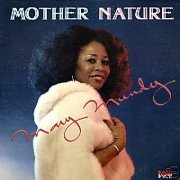 |
Mother Nature (1980, 32.43) ***/TT½Love Me, Love MeYou Put a Hurtin' on Me I Can't Stop Dancin' Each Other Mother Nature Take Me in Your Arms The Ride is Over |
Current availability:
Mellotron used:
Mary Mundy? Released a clutch of singles between the early '70s and early '80s, but, according to Discogs, just the one album, 1980's Mother Nature (thanks for this, Trevor), subsequently disappearing into obscurity. She had a great soul voice, but, in a crowded market and on a small label, it clearly wasn't enough to pull her out of the morass of similar artists. The album's a very acceptable slice of genre soul, I Can't Stop Dancin' being the nearest it gets to the era's dreaded disco, at its best on funky opener Love Me, Love Me.
Mike Reynolds played keys, including Mellotron, possibly the same chap who played one on David Liska's Startin All Over Again from a few years earlier. Anyway, he played 'orchestral replacement' strings (small label, small budget) on all but one track, notably on I Can't Stop Dancin', cleverly arranged to give the impression of being played quickly while actually not being. I was expecting a disco horror, but got a mature soul album with plenty of Mellotron. Very listenable.
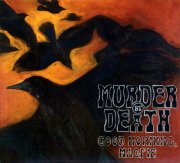 |
Good Morning, Magpie (2010, 37.31) ***½/T½ |
|
| Kentucky Bourbon As Long as There is Whiskey in the World On the Dark Streets Below King of the Gutters, Prince of the Dogs Piece By Piece Good Morning, Magpie You Don't Miss Twice (When You're Shavin' With a Knife) |
Yes Foxglove White Noise! The Day |
|
Current availability:
Mellotron used:
Although I've seen Murder By Death described as 'indie', they're nearer to 'cello-fuelled Americana', at least going by 2010's Good Morning, Magpie, a dark, leprous album of suitably deathlike songs such as As Long As There Is Whiskey In The World and King Of The Gutters, Prince Of The Dogs. Top tracks? Maybe the raucous Piece By Piece and super-intense closer The Day, but there's little, if any filler here.
Either cellist Sarah Balliet or guitarist Adam Turla plays Mellotron (both are credited with keyboards), with a nice little flute part on Foxglove and haunted strings on White Noise!, complete with authentic wobble. Do you bother? Depends on how much you like indie-tinged Americana, I suppose. Not really worth it for the Mellotron, but a sensibly-lengthed album of well-crafted songs.
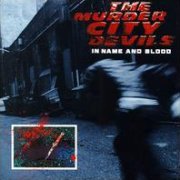 |
In Name & Blood (2000, 37.05) ***/T½ |
|
| Press Gang I Drink the Wine Bunkhouse Idle Hands Rum to Whiskey I'll Come Running Demon Brother Lemuria Rising |
Somebody Else's Baby In This Town No Grave But the Sea Fields of Fire |
|
Current availability:
Mellotron used:
The Seattle-based Murder City Devils are an American garage punk band in the grand tradition, their eponymous 1997 debut rattling through ten ferocious tracks in a mere twenty-two minutes. Despite a couple of keyboard interjections, though, its alleged Mellotron use would appear to be a chimera. Two albums on, 2000's In Name & Blood sees a slightly tamed band, less breakneck than before, many of its songs being quite mid-paced. However, they're no less intense than before, I Drink The Wine and Idle Hands, amongst others, keeping the energy levels up.
Dann Gallucci plays Mellotron, with a string line on opener Press Gang, choir on I Drink The Wine and another string line on I'll Come Running, complete with a note choking off at the end of the song, so, despite its murky sound, it would appear it's a real machine. One for garage nuts and Farfisa fans, I think, with worthwhile Mellotron use.
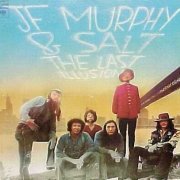 |
The Last Illusion (1973, 41.56) **½/T½Sweet ByrdWhich One Teenage Fantasy Touched By Love Bell Toll New York City Home The Man Who is Alone The Last Illusion |
Current availability:
Mellotron used:
Now all-but forgotten, J.F. Murphy & Salt's piano-driven psych/country/blues/jazz was apparently quite a draw on the early '70s New York scene; a bit of a hippy-era hangover, they haven't dated particularly well, although Elton John and fellow New Yorker Billy Joel would find success with a more contemporary version of the same sound. Their third album, 1973's The Last Illusion, throws all those influences into the pot, Ron Allard's prevailing sax work to the fore, although their true colours as a proto-jamband are finally revealed on the ten-minute New York City/Home segue. Other better tracks include Bell Toll and the lengthy closing title track, but it's all a bit 'of its time', I'm afraid.
Murphy plays Mellotron, along with his lead vocal/guitar/piano role, with a pseudo-string section part on Touched By Love and cellos and strings on The Man Who Is Alone. Those of you who delight in obscure '70s jazz/blues/rock will be delighted by this, although the rest of us, despite a couple of reasonable Mellotron tracks, may wish to walk on by.
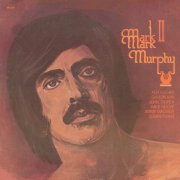 |
Mark II (1974, 38.39) **½/T |
|
| Chicken Road Too Much Love The Unfaithful Servant Lookin' for Another Pure Love Barangrill Triad They Sleeping |
Lemme Blues Truckin' |
|
Current availability:
Mellotron used:
Mark Murphy (1932-2015) was considered a jazz singer, although 1974's Mark II (actually his thirteenth release) is an über-mainstream, slightly jazzy pop album of its era, possibly at its best on Barangrill and upbeat closer Truckin', while Lemme Blues takes the booby prize for, despite doing what it says on the tin, being the dullest thing here.
Ken Ascher (John Lennon, many others) on Mellotron, with 'orchestral replacement' strings on Too Much Love and Sleeping, to passable effect. It's no great surprise this has never been on CD; despite its professionalism, music like this couldn't be more unfashionable if it tried. And long may it last.